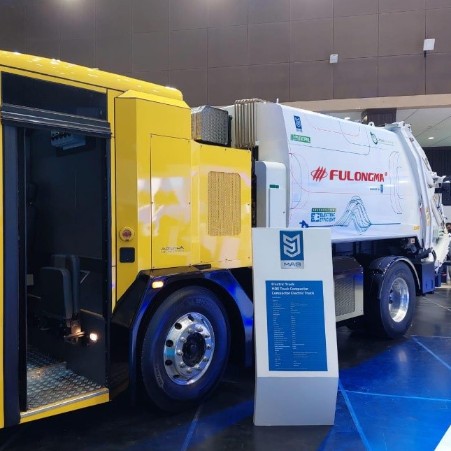Traditionally, diesel-powered garbage trucks have been the backbone of waste collection services worldwide. These robust machines have served communities for decades, ensuring that our streets remain clean and free of waste. However, their environmental cost is significant, contributing to air and noise pollution. With increasing regulatory pressure and environmental awareness, the waste management sector is now turning towards electrification, heralding a new era of sustainable urban cleanliness. Among these, the waste management sector is witnessing a quiet revolution: the rise of electric garbage trucks. These eco-friendly giants are rolling through urban and suburban streets, promising cleaner air and quieter neighborhoods.
Advantages of Electric Garbage Trucks

Electric garbage trucks offer a multitude of benefits that make them an attractive alternative to traditional diesel-powered vehicles.
Emission Reductions
One of the most compelling advantages of electric garbage trucks is their ability to drastically reduce emissions. Unlike diesel trucks, electric models produce zero tailpipe emissions, significantly lowering levels of nitrogen oxides (NOx) and particulate matter (PM) in the atmosphere. This reduction in harmful pollutants leads to cleaner air and a healthier urban environment, contributing to the fight against climate change and improving public health.
Noise Pollution
Electric garbage trucks operate much more quietly than their diesel counterparts. The loud, rumbling engines and hydraulic systems of traditional trucks can disrupt neighborhoods, especially during early morning collection hours. In contrast, electric trucks produce minimal noise, enhancing the quality of life for residents and allowing for more flexible waste collection schedules.
Energy Efficiency
Electric garbage trucks are more energy-efficient than diesel trucks. They convert a higher percentage of energy from their batteries into motion, reducing overall energy consumption. This efficiency translates into lower operational costs and less energy waste, making electric trucks a more sustainable choice for waste management.

Battery Technology
Advancements in battery technology have significantly improved the range and power of electric garbage trucks. Modern lithium-ion batteries offer greater energy density, allowing trucks to travel longer distances on a single charge. Additionally, advancements in battery management systems ensure efficient energy use, prolonging battery life and reducing maintenance needs.
Charging Infrastructure
The development of charging infrastructure is crucial for the widespread adoption of electric garbage trucks. Cities are investing in charging stations and systems to support these vehicles, facilitating easy and convenient charging. Fast-charging technology further reduces downtime, allowing trucks to recharge quickly and efficiently during off-peak hours.
Smart Technology
Electric garbage trucks are equipped with smart technology, such as Internet of Things (IoT) devices and telematics systems, to optimize waste collection routes and improve fleet management. These technologies enable real-time tracking, monitoring, and analysis, enhancing efficiency and reducing operational costs. Smart systems also allow for predictive maintenance, minimizing downtime and ensuring optimal performance.

Cost Savings
While the initial cost of electric garbage trucks is higher than that of diesel trucks, they offer significant cost savings over their lifespan. Electric trucks have lower operating costs due to reduced fuel expenses and maintenance requirements. Electric motors have fewer moving parts than diesel engines, resulting in less wear and tear and lower maintenance costs. Additionally, electricity is generally cheaper than diesel fuel, further contributing to long-term savings.
Conclusion
Electric garbage trucks represent a transformative shift in waste management, offering a cleaner, quieter, and more efficient alternative to traditional diesel-powered vehicles. With their environmental benefits, technological advancements, and cost savings, these vehicles are poised to become the future of waste collection. As cities and companies continue to prioritize sustainability, the adoption of electric garbage trucks will play a crucial role in achieving cleaner and greener urban environments.
FAQs
How do electric garbage trucks benefit the environment?
Electric garbage trucks produce zero tailpipe emissions, reducing air pollution and greenhouse gas emissions. They also operate more quietly than diesel trucks, reducing noise pollution in urban areas. By utilizing renewable energy sources for charging, electric garbage trucks further minimize their environmental impact.
What are the cost implications of switching to electric garbage trucks?
While electric garbage trucks have higher upfront costs, they offer significant long-term savings through reduced fuel expenses and maintenance costs. Government incentives and subsidies can help offset initial costs, making the transition more financially viable.
How do electric garbage trucks compare to diesel trucks in terms of performance?
Electric garbage trucks offer comparable performance to diesel trucks in terms of speed and payload capacity. Advances in battery technology have improved their range and power, making them suitable for urban waste collection routes. Additionally, electric motors provide instant torque, allowing for smoother acceleration and operation.
What challenges do municipalities face in adopting electric garbage trucks?
Municipalities may face challenges such as higher upfront costs, limited charging infrastructure, and the need for training and maintenance expertise. However, these challenges are being addressed through government incentives, investment in charging infrastructure, and partnerships with manufacturers to provide training and support.
What technological advancements are driving the success of electric garbage trucks?
Advancements in battery technology, charging infrastructure, and smart systems are driving the success of electric garbage trucks. These technologies enhance performance, reduce operational costs, and improve efficiency, making electric trucks a viable and attractive option for waste management.






